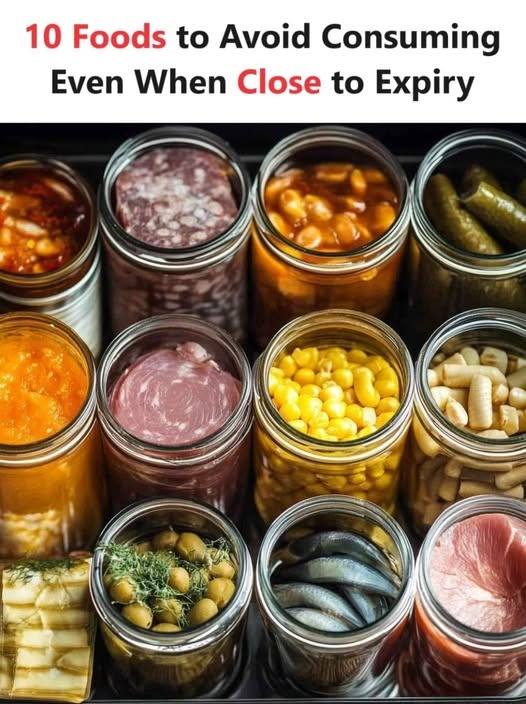ADVERTISEMENT
3. Eggs
Eggs can carry Salmonella bacteria, which becomes more dangerous as they near expiration. Even if eggs look fine, consuming them too close to their expiration date increases your risk of foodborne illness.
How to Test Egg Freshness:
- Water Test: Place the egg in a bowl of water. If it floats, do not consume it.
- Smell Test: A rotten or sulfur-like smell means the egg has gone bad.
Better Alternative: Store eggs properly in the refrigerator and consume them within 3-4 weeks of purchase.
4. Fresh or Pre-Cut Fruits and Vegetables
Fresh produce may seem safe to consume until it visibly rots, but pre-cut fruits and vegetables carry a higher risk of bacterial contamination as they near their expiry date. Moisture and exposure to air make them a breeding ground for E. coli and Salmonella.
Signs to Watch For:
- Slimy texture
- Dark or mushy spots
- Unpleasant odor
Better Alternative: Buy whole fruits and vegetables and cut them fresh instead of purchasing pre-cut versions.
5. Seafood and Shellfish
Fish and shellfish are extremely perishable, even when refrigerated. As they near expiration, they develop harmful bacteria and toxins, which can cause severe food poisoning.
Signs to Watch For:
- Strong fishy smell
- Slimy or sticky texture
- Change in color (grayish or dull appearance)
Better Alternative: Always consume seafood within 1-2 days of purchasing, or freeze it immediately if you don’t plan to use it soon.
6. Leftovers and Cooked Foods
Even if stored properly, leftovers and pre-cooked meals develop bacteria over time, especially if they have dairy, meat, or eggs. Consuming leftovers close to or past their expiration date is risky as bacteria like Clostridium perfringens can thrive in improperly stored cooked food.
Safe Leftover Storage Guide:
- Refrigerated leftovers: Consume within 3-4 days
- Frozen leftovers: Can last up to 3 months but should be reheated properly before consuming
Better Alternative: Always label leftovers with the date they were made and freeze them if you don’t plan to eat them soon.
7. Canned Foods with Dents or Bulging Lids
Canned foods may have a long shelf life, but they become dangerous if stored improperly or when close to expiration. Dented, bulging, or rusted cans can indicate botulism contamination, a rare but deadly form of food poisoning.
Signs to Watch For:
- Swollen or bulging cans
- Hissing sound upon opening
- Bad smell inside the can
Better Alternative: Always store canned goods in a cool, dry place and check for dents or rust before purchasing.
8. Mayonnaise and Salad Dressings
Condiments like mayonnaise and creamy salad dressings can develop bacteria as they near expiration, especially if they are frequently left at room temperature. The high oil and egg content makes them highly perishable.
Signs to Watch For:
- Separation of ingredients
- Sour or rancid smell
- Mold growth around the lid
Better Alternative: Store mayonnaise and dressings in the fridge and avoid using expired or near-expiry products in dishes that won’t be cooked.
9. Flour and Baking Mixes
Dry ingredients like flour and baking mixes may not seem like a risky food, but they can harbor mold and insects (like weevils) if stored for too long. Expired flour can also develop a rancid smell due to oil content in certain types, like whole wheat flour.
Signs to Watch For:
- Bad or stale odor
- Visible insects or mold
- Clumping or discoloration
Better Alternative: Store flour in an airtight container in a cool, dry place and use it within 6-12 months.
10. Soft Drinks and Carbonated Beverages
While soda and fizzy drinks don’t pose a bacterial risk, they lose carbonation and flavor as they near expiration. Expired carbonated drinks may taste flat or develop an off-putting flavor.
Signs to Watch For:
- Flat or weak carbonation
- Change in taste or color
- Strange aftertaste
Better Alternative: If you notice soda nearing its expiration date, use it in recipes or cleaning hacks instead of drinking it.
Final Thoughts
Not all foods should be consumed close to their expiration date, even if they look and smell fine. Some can develop dangerous bacteria and toxins, leading to serious health risks. To stay safe, always check for signs of spoilage and store food properly to extend its shelf life.
By being mindful of expiration dates and food safety, you can reduce food waste while protecting your health!
ADVERTISEMENT
ADVERTISEMENT
